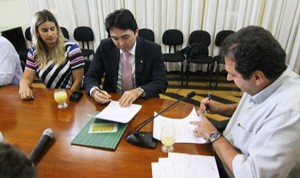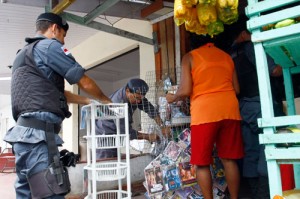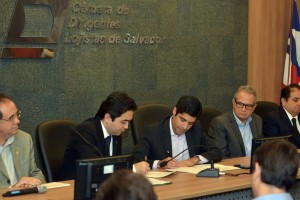Cidade is the 14th member of an initiative to curb illegal trade coordinated by ETCO
The city of Blumenau, in Santa Catarina, adhered to the Free City Piracy Project. With this, the municipality becomes the fourteenth to integrate the program of the National Council to Combat Piracy, an organ of the Ministry of Justice. The project is coordinated by ETCO-Brazilian Institute of Ethics in Competition and, in six years of history, has won the participation of 13 municipalities, including São Paulo, Porto Alegre and Brasília.
The project seeks to expand the involvement of cities in combating the sale and distribution of pirated products. The city halls, as is known, are responsible for the inspection and for the granting and revocation of licenses and business licenses. Unfortunately, however, some do not pay due attention to the problem of piracy. One of the main reasons is the lack of integration with the other levels of government for joint actions. This is the main focus of Cidade Livre da Pirataria.
When the project started in 2009, the priority was to sign agreements with the cities that would host the 2014 World Cup. “We achieved our goal. Only one of the headquarters was not part of the project ”, recalls Márcio Gonçalves, who coordinated the work between 2009 and 2014.
Union, states and municipalities
By signing the agreement, the city commits to coordinating anti-piracy measures with inspection and seizure of products, in addition to awareness campaigns. The work includes the Public Ministry, the police and the tax authorities.
Brazilian law provides that all entities of the federation - the Union, states and municipalities - act against the trade in illegal products. In addition to the responsibility of the city halls, the Federal Government must act through the Federal Police and the Federal Revenue Service, which have tools to face the smuggling and embezzlement of goods. The states are responsible for investigative and inspection actions, through the Military and Civil police. "The fight against piracy must be the result of a joint effort between all these actors", says Gonçalves.
The greatest example of success in this integration work proposed by Cidade Livre de Pirataria is the case of São Paulo. Between 2010 and 2012, the city coordinated a work to combat piracy that resulted in the prolonged closure of several popular shopping malls that served as real centers for selling and distributing pirated products. The result of this constant action can be felt even in other regions of the country. “Camelódromos in other cities stopped working, because pirated products were purchased in São Paulo, where commerce was facing greater barriers”, says Gonçalves.
To enhance this type of effort, the National Prize for Combating Piracy was also created, an initiative that aims to reward the best projects to combat illegal trade. The idea is to highlight public and private entities that have taken outstanding initiatives in tackling crimes against piracy and intellectual property. The winners of the fourth edition of the award will be announced at the same ceremony in which Blumenau will join the Cidade Livre de Piracy Project, on September 11th. In addition to the announcement of the winners, the event should also mark the launch of the next edition of the award.


 The mayor of Natal, Carlos Eduardo, signed on March 21 the term of agreement and cooperation of the Cidade Livre de Piratação project, of the National Council for Combating Piracy and Offenses against Intellectual Property (CNCP) of the Ministry of Justice. The project, managed by ETCO, has already been adopted by 10 cities.
The mayor of Natal, Carlos Eduardo, signed on March 21 the term of agreement and cooperation of the Cidade Livre de Piratação project, of the National Council for Combating Piracy and Offenses against Intellectual Property (CNCP) of the Ministry of Justice. The project, managed by ETCO, has already been adopted by 10 cities.



